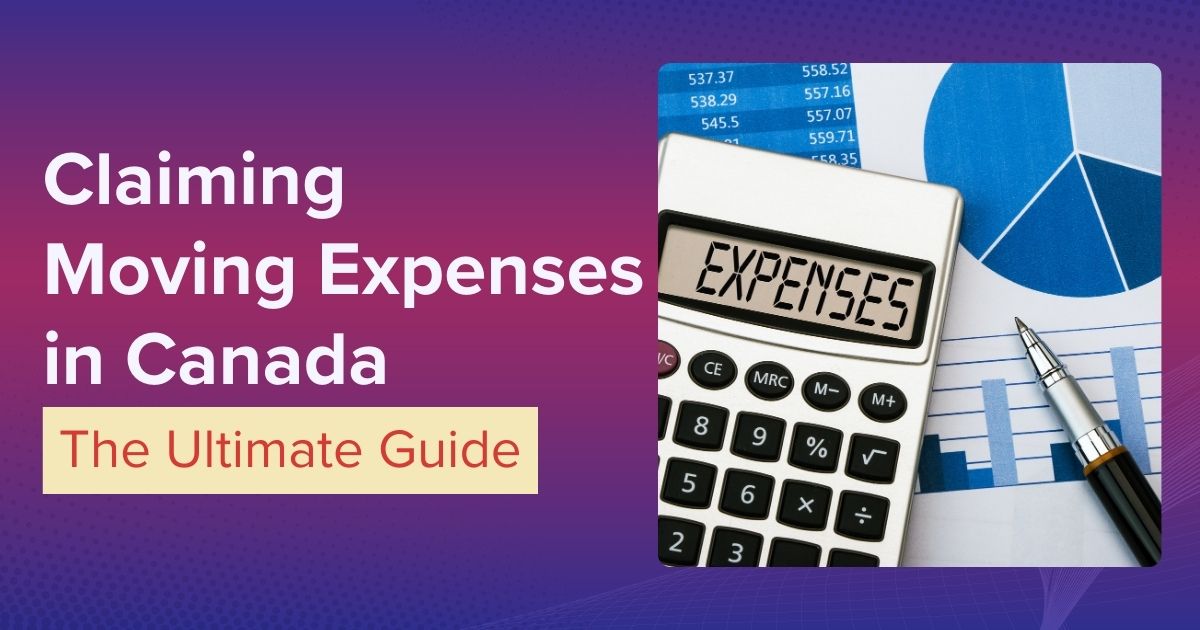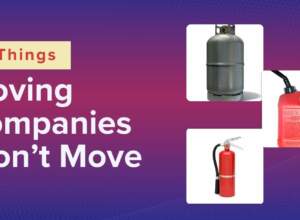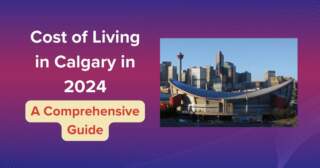Every year, people hire professional packers and movers in Canada and wonder if they can claim moving expenses at tax time.
The answer is yes but with a caveat. You could be eligible to claim moving expenses; however, you must check the eligibility requirements carefully.
The most important point is that the move must be within 40 kilometers of your workplace, educational institute, or the business you are starting. If you only work at home, the quick answer is no, although you can claim some operating costs (hydro and internet) if you work remotely and use your home as an office.
Read on to determine if you qualify for this tax benefit and what items you can—and can’t—deduct.
We’ll review the moving costs you can deduct and what to do when you get to line 21900 of your Canadian tax return this year.
8 Canadian Moving Services You Can Claim in 2024
Did you know that you could deduct most of your moving expenses or costs related to selling your home on your personal income tax return?
A long list of tax-deductible items is associated with moving to a new home beyond the cost of professional movers.
“One can claim moving expenses in Canada; however, it’s subject to scrutiny,” says Sebastian Jania, owner of Ontario Property Buyers. “Eligible moving expenses come down to the reason for moving and the advantage of moving.
Moving closer to the water or a more pleasant climate doesn’t qualify unless it’s closer to where you will conduct work or studies. It all comes down to whether one is moving their primary residence for a new job, running a business, or attending school full-time. Further, it ultimately comes down to how much closer one is moving to where they will be working (or studying).”
We also asked Sukhi from the Tax Warriors, who says, “Eligible moving expenses encompass a wide range of costs associated with relocating, including transportation and storage costs, travel expenses, temporary living expenses, and even costs related to selling or terminating your old residence.”
Sukhi reminds us that not all fees are fair game, so ensuring your claim falls within the CRA’s guidelines is crucial.
1. Moving and storage costs
These costs include professional moving services, such as packing, truck rental, moving labour, in-transit storage, and insurance for moving items, including large watercraft and trailers.
2. Travel expenses
You can claim the meals, accommodation, and vehicle expenses you incur while moving to a home closer to work or school.
3. Temporary living expenses
You can claim up to 15 days in a hotel or other temporary accommodation on your taxes if it’s related to your move.
4. Lease cancellation costs
Do you have to break a lease to move to a new home closer to work or school? Pay the cancellation cost, get a receipt, and add it to your claim. Lease cancellation costs don’t include any due rental payments.
Incidentals can include replacing your driver’s license, changing your address on legal documents, and even utility hook-ups and disconnections.
6. Cost to maintain your old home.
You can claim up to $5,000 in home maintenance costs while your home is on the market or even if you’re renting your old home. Maintenance costs include interest, property taxes, insurance premiums, and utilities.
7. Cost of selling your old home
Selling your home can include advertising costs, legal fees, notary public, real estate commission, and the mortgage penalty when you pay the mortgage before maturity.
8. Cost of buying your new home
Did you sell a house to move to work or school?
You can claim the legal or notary fees and any taxes paid (other than GST/HST) to transfer or register the new home’s title to your name. The most important thing is to keep track of such expenses to make them easy to claim during tax time.
6 Moving Expenses, You Cannot Claim
Now, there are some things you should know before you start claiming moving expenses. For instance, there are things you cannot claim as expenses:
1. Moving
If you spent money updating your home by adding curb appeal, a new bathroom or pool, or even updating the house to bring the electricity, foundation, or plumbing up to regulation standards. In that case, you can’t claim these expenses.
2. Items that movers can’t move
Moving items that movers can’t take: pets, plants, guns and ammunition, anything flammable, like cleaning and BBQ products, or alcohol (including wine collections). These expenses are not eligible for complaining.
3. Cleaning and repairs
If you are moving from a home you have rented and you have to spend money fixing items that need fixing (holes in walls, pet-related mess). You will not be able to claim these expenses.
4. Forwarding mail
You cannot claim costs associated with forwarding mail due to a move.
5. Traveling to look for a home or scout a new school
You cannot claim expenses incurred for traveling to look for work in your new location or visit a school you hope to attend.
6. Loss from sale of a home
Claims due to loss from the sale of your home, including marketing, the expense of a real estate professional or attorney, and staging the house for resale are excluded from claimable items.
Generally, you cannot deduct the cost of moving a mobile home. However, suppose you have personal items in the mobile home during moving. In that case, you can deduct the cost of driving the house so long as it is not more than the estimated cost of moving those personal items separately.
Read on to learn more about the eligibility criteria for claiming moving costs.
Eligibility Criteria for Claiming Canadian Moving Company Costs
Not every Canadian, and every move, can be claimed. Here’s what you need to know to make sure you’re making a legitimate claim.
Before you start tallying up your boxes and receipts, says Sukhi from Tax Warriors, you must meet to qualify for claiming moving expenses on your 2023 tax return.
CRA criteria for claiming your moving expenses
Sukhi from Tax Warriors says, “Firstly, your move must relate to your employment, business, or full-time post-secondary education. Your relocation must significantly impact your ability to earn income or attend school.
Next up, there’s the matter of distance. Congratulations if your new home is at least 40 kilometres closer to your new workplace or school than your previous residence. You’ve met another requirement for claiming those moving expenses. Remember that this distance is measured using the shortest usual public route available.”
Calculation Methods: Simplified vs. Detailed
There are two ways to add moving expenses: the simplified and detailed methods and different ways to claim eligible expenses.
Detailed Method
Here’s how to calculate your moving expenses using the detailed method.
- Meal expenses: If you use the detailed method to calculate your meal expenses, you must keep all your receipts to claim the exact amount you spent.
- Vehicle expenses: Using the detailed method to calculate your vehicle expenses, you must keep all receipts and records. Claim the amount you spent on your vehicle expenses during the tax year.
Simplified Method
Here’s how to calculate your moving expenses using the simplified (flat-rate) method.
- Meal expenses: You can claim a flat rate per person. You do not need to keep detailed receipts for actual costs, but we still encourage you to keep receipts because the CRA may ask you to support your claim.
- Vehicle expenses: If you use this method to claim vehicle expenses, multiply the number of kilometres by the cents/km rate for the province or territory where the travel began.
Whichever method you choose, experts agree the best thing you can do is to keep all your receipts and documents supporting your claim.
What to Do at Line 21900 of Your Taxes?
When reporting your moving expenses on your tax return, you’ll want to pay close attention to a couple of crucial CRA forms.
First, there’s Form T1-M, the “T1-M: Moving Expenses Deduction” form (or the TP-348-V: Moving Expenses form in Quebec), where you’ll itemize your eligible moving expenses.
If you’re self-employed or a business owner, you must complete Form T2125, “Statement of Business or Professional Activities,” to report any moving expenses related to your business.
Are you thinking of Claiming moving expenses? Keep your receipts!
We always suggest using a local moving company that will provide you with clear and accurate records of your moving expenses, including a receipt for your payment.
Keeping receipts is necessary if the Canada Revenue Agency (CRA) asks to see them. We suggest filing a paper copy in your 2024 tax file folder and keeping a digital record in your tax software or accounting app so you always have a backup if something happens to one of the copies.
Conclusion: Can You Claim Your Moving Cost
The most recent information shows that moving expenses’ rules have remained unchanged. However, staying current with any updates or changes from the CRA is always prudent, as tax regulations can evolve.
Claiming moving expenses on your 2023 tax return in Canada is possible, provided you meet the criteria outlined by the CRA.
Remember to keep meticulous records of your costs and consult with a tax professional if you need clarification on your eligibility or how to report your moving expenses properly. Dedicatedning allows you to identify tax season and maximize your potential deductions.


















